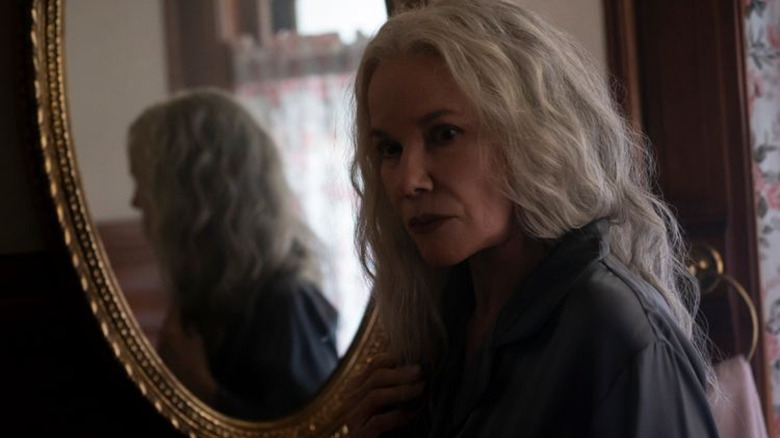
Axelle Carolyn is a one-woman indie horror powerhouse. In 2015, she inspired a handful of horror directors to contribute to "Tales of Halloween," a horror anthology centered on the best holiday. She went on to direct episodes of "American Horror Story," "Creepshow," and "The Haunting of Bly Manor," cementing herself as a person to watch in horror. Now she's teamed with the folks at Amazon and Blumhouse for "The Manor," one of the new crop of "Welcome to the Blumhouse" films.
In "The Manor," written and directed by Carolyn, Barbara Hershey stars as a dancer who is forced to retire and live in a nursing home after she has a minor stroke. She doesn't like the fact that they won't let her have her phone or the access code to leave, but her family reassures her that it's for her own benefit. When some of her fellow residents start dying under mysterious circumstances, however, she thinks something supernatural might be lurking in the building.
I spoke with Carolyn via Zoom about the joys of shooting a horror movie, the inspirations behind "The Manor," and the best Halloween anyone's ever had. "The Manor" hits Amazon Prime on October 8, 2021.
This interview has been lightly edited for clarity.
The Halloween John Carpenter Crashed The Set
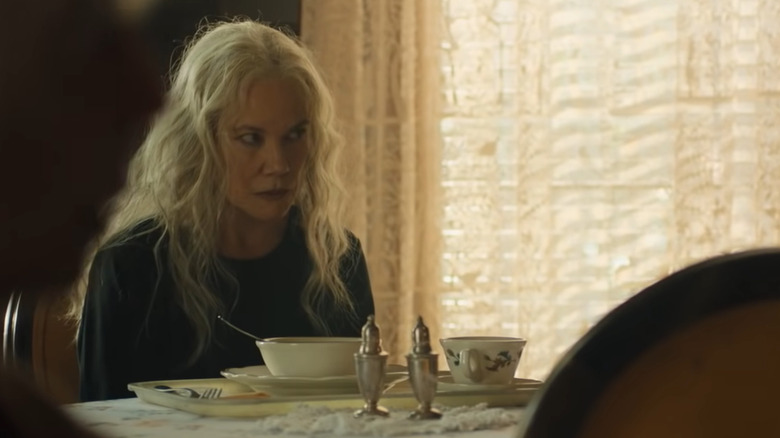
Did you have any really fun on-set experiences with this movie, either shooting in the big spooky house or just working with a legend like Barbara Hershey?
Yes. Yeah, it was one of the most fun shoots I've ever had, to be honest. It was a really good team. It worked really nicely. Like pre-production was really hard. Post-production was really hard. The pandemic hit while we were doing post, but the shoot itself was just such a delight. I kind of wish we could release the bloopers, or that someone could string together the bloopers from the film because there's so many little moments that were captured on camera where Barbara was hilarious.
I had one day that was particularly phenomenal. We shot on Halloween and that's the one that I keep going back to because it was just such a fantastic day. I've always loved Halloween. It's my favorite holiday, obviously, because I'm such a huge horror fan. So we're shooting and it's the first time we're going to be seeing the monster, so it's the first time that I get to see the full suits come together. And I'm dressed as a witch because all the crew has dressed up for the day. There's like the costume ladies are dressed as the twins from "The Shining." The DP is dressed as John Wick.
Already from the start, it was such a fun day, to begin with. And then John Carpenter visited the set, which was completely, you know, I didn't expect it. It was such an amazing treat and just made the entire day just– He showed up for lunch. He visited, I think he was at video village at some point, but thank God I didn't see that because thinking that John Carpenter is watching me when I'm shooting would've been very, very intimidating, I guess. But he showed up at lunch and he said, "Look, I've seen some of the dailies. I think you're doing great." And then kind of left after lunch. And at the end of the day, I remember sitting in my car just going, wow, what a day? All this happened. Holy sh*t. That's a lot of bucket list items that I can cross off.
That's incredible. That's the best Halloween ever.
Oh, it was awesome. It was awesome. And that was, by the way, that visit was thanks to our amazing producer, Sandy King [Carpenter], who's produced a lot of his movies and she just felt like it was a nice treat for the close. You know, we're all huge fans.
"We Just Don't Tend To Believe People In The Same Way."
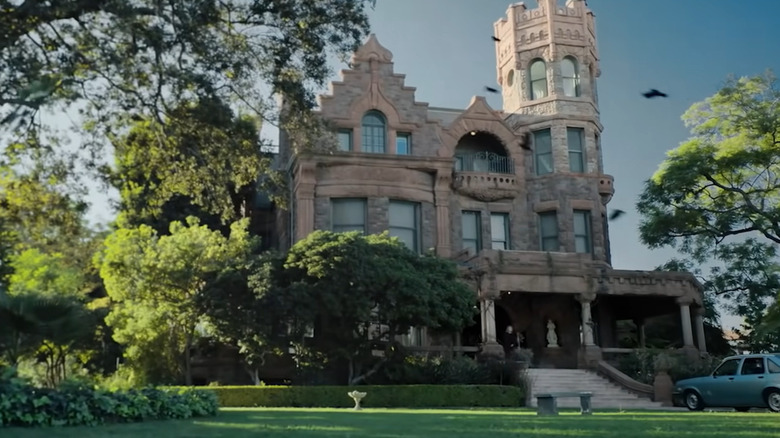
What inspired The Manor? What sort of brought you to writing this story and making this film?
I think it's a combination of general concerns I've always had about aging, about seeing other people age, like seeing my loved ones age. About having to visit loved ones in nursing homes and what that does to the way that you think about mortality and about the way that, that we deal with the elderly as a society. And that our society is aging, and we haven't found good solutions to keep people in their homes, and to keep people happy, and to take care of them over a certain age when they start having some of their abilities declining. It was that, and then all those themes combined with the fact that from a storytelling point of view is just...
You always look in horror for a way to get rid of the protagonist's phone, a reason they're not escaping the house they're in, and for help to not show up. And all those are in the nursing home because so many nursing homes don't allow you to have your own phone. So many nursing homes will not let you out of the house unless you have a code that's never given to the residents. And so many nursing homes will not ... You know, we just don't tend to believe people in the same way. And none of that is a slight on nursing homes, by the way. I have nothing but admiration for people who work [as] staff in nursing homes, [it's] such an incredibly tough job to do. But again, it goes with the fact that we haven't found great solutions for this as a society, I guess. It just felt like it was an environment that was right for scares.
A Little Bit Unusual
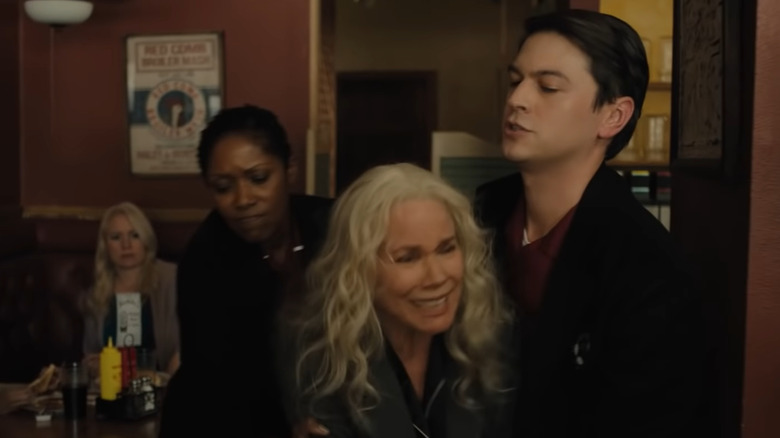
Each of these "Welcome to the Blumhouse" movies this time have a really unique protagonist that you might not get to see in a mainstream movie. So tell me a little bit about having a 70-year-old woman as your movie's heroine.
Yeah, it was something I thought was going to be ... At first when I wrote it, and I very naively thought it would be easier to do, not in terms of writing or in terms of directing or anything like that, but just in terms of setting up the movie and getting it made and getting people to believe in this. I thought naively that I would be like, but look at the amount of amazing 70-year-old actresses that we can... Like it's such an untapped resource in some ways. There's such a huge amount of people who haven't worked in leading roles in a while, and especially not in horror. It's going to be great. And then you realize the reality of it is that ... There's a reason that potential is untapped, and it's just that people don't like to greenlight movies that have 70-year-old protagonists.
So a lot of companies would read the script and say, "We really like it, but could it be set in a mental institution instead, or could it be about the grandson and his experience seeing his grandma?" And that just wasn't what the subject of the film was. And it took finding Amazon and Blumhouse to have a place that would just really embrace the fact that it's great to have someone different. And it's awesome to have protagonists who are a little bit unusual, and they really pushed that aspect and they loved it about it. It was having their support that made all the difference.
Breaking Boundaries With Blumhouse
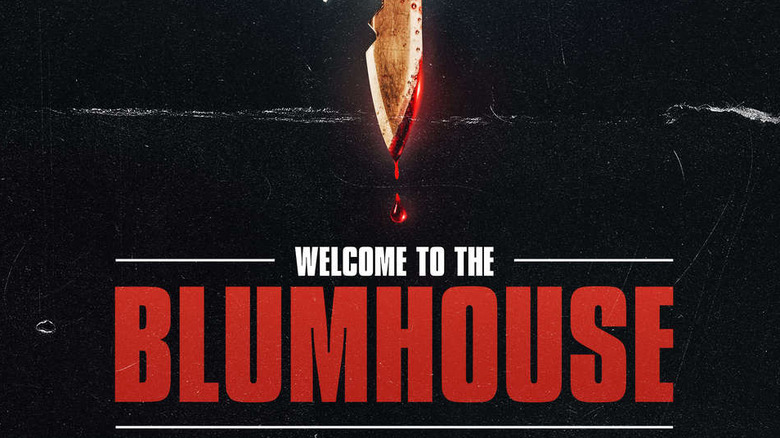
So you've done quite a bit of horror.
Oh yeah.
How does it feel to be working with Blumhouse?
Great. Originally it was the script was sent to Amazon, and so Amazon was going to make it. And then when they had their partnership with Blumhouse, that's when they decided to put it under that umbrella. They kind of decided everything we're going to do that's horror, we're going to do with Blumhouse. So that's going to be the partnership there. But yeah, again, it's just that kind of... The fact that people who are so well known, like such a well-known brand in horror, would take the chance to make a movie about a very different protagonist and a very different environment was awesome because it, right away, gives it more exposure, gives it more kind of... Maybe it makes people expect a certain type of movie, which sometimes doesn't work to your advantage, but hopefully makes it clear to people that when they start watching this movie, even though the beginning may not have a lot of supernatural scares, it'll happen. It'll get there. It is a Blumhouse movie.
"There's An Infrastructure And Voices Kind Of Carrying You And Helping You Get There."
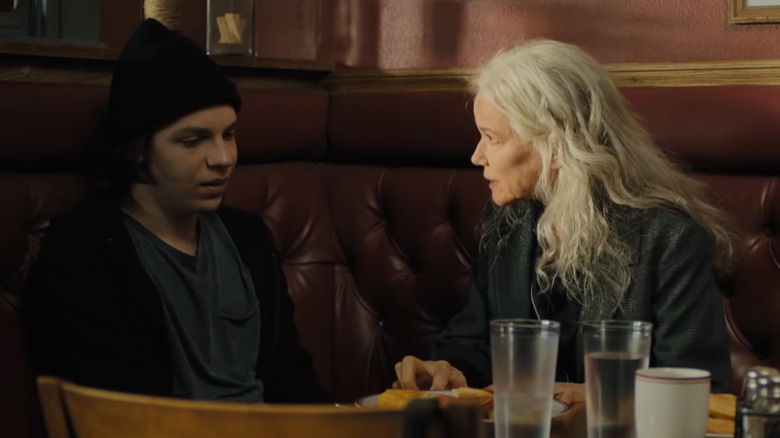
You've been doing a lot of horror TV lately. How is filming TV different than making a horror movie?
I think that slightly different art forms, not so much TV from film, but directing episodic as opposed to directing your own stuff. So it's material I haven't generated and you're kind of fulfilling the vision of someone else to a degree. It really depends on the show. Mike Flanagan really gives you a lot of freedom and he picks the filmmakers who he thinks are going to work well with the sensibility of the script. And then he makes you this beautiful gift of this incredible script. He's like, go and make that. And then he kind of leaves you to it and trusts you with it. And that's awesome because, in some ways, it feels like you're making your own thing, and you can make it very personal. That episode of "Haunting of Bly Manor" I got to do was my first TV experience as a director, and was just such a, again, such an incredible gift, because it was so tailored to my tastes and it was so beautiful.
And it feels like you can make something personal, but there's someone ... Like there's an infrastructure and voices kind of carrying you and helping you get there. And thank God, because you have to make it faster than movies, obviously, but it was just a fantastic experience. And then on some other shows, you fit more into someone else's voice, and that's fun too because, if you're lucky enough to get to choose the project that you work on, I have been incredibly privileged to be able to do that, you work on stuff that you connect with. And so whether it's someone else's vision that you're fulfilling or not, you get to play with it, like "American Horror Story." I loved the story that I was telling in that episode. You get to play with all that talent, like Frances Conroy and Sarah Paulson and all those amazing people. It's just really cool to go in and do that. And then you can go back to doing your own stuff and then go back to doing episodic.
Read this next: The 11 Scariest Scenes In The Halloween Franchise
The post The Manor Director Axelle Carolyn Dishes on her Nursing Home-bound Horror [Interview] appeared first on /Film.
0 Commentaires